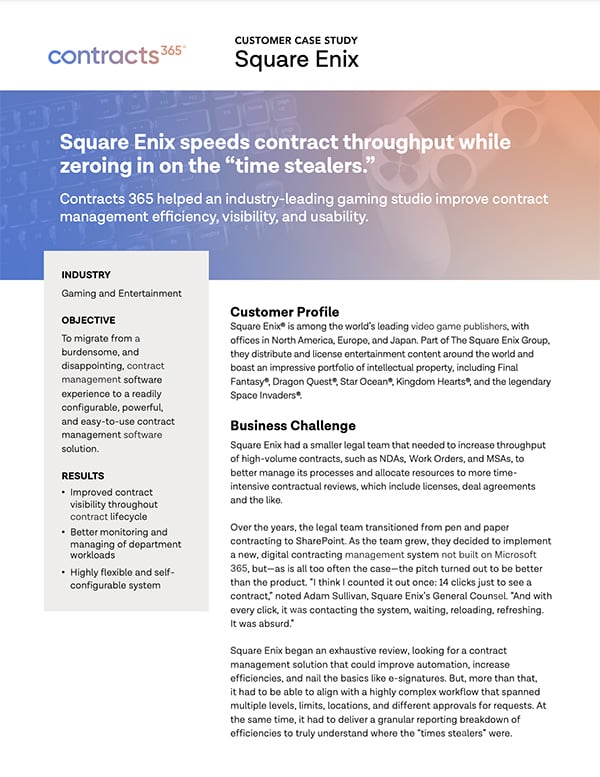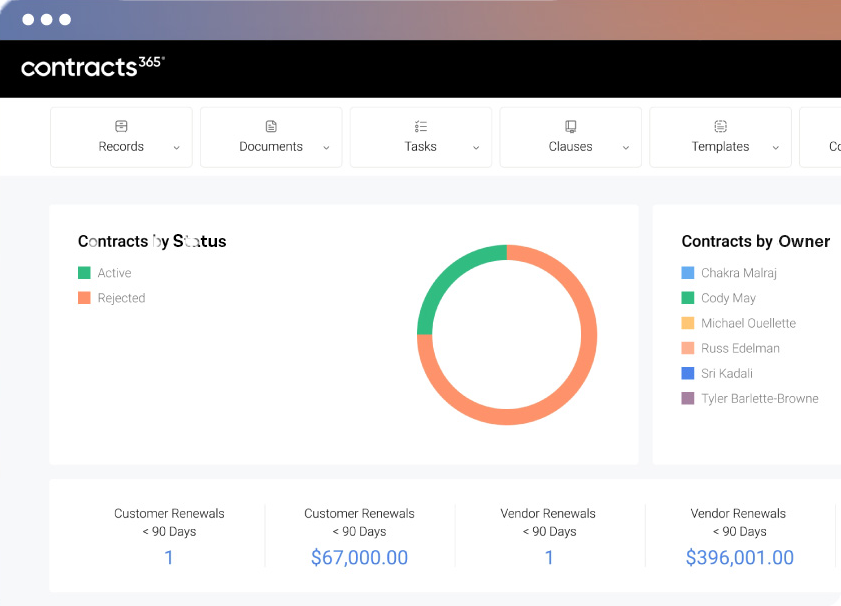5 Signs You Need a New Contract Management System
No matter what business you’re in, chances are your company is a party to a variety of contracts that help keep things running smoothly and predictably. If your company’s contracts are difficult to access, cumbersome to create and complete, or unreliable, it can lead to costly mistakes. In fact, World Commerce & Contracting research shows that ineffective contract management can impact up to 9% of a company’s bottom line. Especially in today's dynamic business environment, effective contract management is crucial for ensuring operational efficiency, mitigating risk, and seizing growth opportunities.
Today’s contract lifecycle management software (CLM Software) is revolutionizing the way businesses manage their contracts, making processes simpler, faster, and more reliable throughout the contract lifecycle. Effective software can streamline contract creation, automate notifications, close deals faster, and save you money. In this article, we’ll examine five common scenarios that indicate the old system isn’t cutting it and it’s time to invest in up-to-date contract management software.
.png?width=467&height=550&name=Group%2019%20(1).png)
1. You spend significant staff time locating contracts or key provisions.
It’s critical to stay on top of deadlines, renewals, deliverables, and other aspects of your company’s contracts. Consider how your employees currently keep track of such items and how much time they’re spending on those activities. For example, if someone from the sales or procurement team needs to know when a specific contract expires, how much the company is paying for a service, or whether a particular action would constitute a breach, how do they go about finding that information, and how much staff time does it take?
According to a study by Butler Group, organizations are using up to 10% of salary budgets on time spent searching and retrieving information. Often, this retrieval involves requesting information from the contract management team, who could otherwise be spending their time on higher-value activities. To help mitigate these unseen costs, contract management software lets anyone with the appropriate permissions conduct quick, detailed searches and deliver accurate results. The best solutions are intuitive for users and serve up needed information with minimal clicks and load time, putting vital information at the fingertips of those in your organization who need it most.
2. Your contracting process is slow and cumbersome.
Creating contracts using a paper or even a desktop-based system can require a great deal of manual effort from the legal team. To ensure compliance and consistency and mitigate risk, they must take care when drafting contracts to use only approved language, identify terms that create unnecessary risk, and create win-win deals that provide the greatest possible benefit to the company.
After contracts are created, the back and forth involved with gaining approvals and collecting signatures can further slow the contracting process. If your current system doesn’t help parties quickly access the information they need, efficiently collaborate, and respond promptly when their action is needed to proceed, then you may be spending much more time than necessary on routine tasks. Additionally, the signature process alone can slow contract generation, even when using electronic signature technology.
Cloud-based CLM software streamlines the entire contracting process, from creation through approval and signing. A modern, cloud-based contract repository facilitates contract creation with smart search features that make it easy to quickly locate approved contract terms, and it lets users create new contracts using wizards and templates that can be automatically populated with pre-approved language. Today’s contract management systems can also be used to create automated workflows, which can send notifications and alerts to keep everyone on track and ensure they know when they need to act. This helps keep your deals moving smoothly so they can be quickly closed and signed. In fact, a survey of Contracts 365 customers found that utilizing cloud-based contract management software led to a 52% average reduction in contract processing time, and a 42% average reduction in contract processing costs.
When it’s time to gather signatures, the best contract management system will integrate seamlessly with major electronic signature platforms and other widely used business applications. This creates a streamlined signing process, eliminating the need for additional software or logins. Delivery and return of documents is quick, easy, and intuitive, allowing for a shorter sales cycle and faster revenue generation.
3. You’re facing compliance issues.
If your business has run afoul of regulatory guidelines in your contracts, you’re not alone. KPMG found that business units do not adhere to up to 70% of defined contract terms. CLM software makes it simple to avoid non-compliance issues. The ability to integrate pre-approved language into contract templates helps ensure your contracts are always compliant with the latest industry regulations.
Contract management software also helps ensure the contracting process remains compliant with company procedures and protocols, tracking all changes along the way and notifying your team of all needed reviews and approvals. It makes it easy to periodically audit contracts to verify compliance and identify potential vulnerabilities. This can provide a tremendous boost to your company’s risk management procedures.
4. You’re missing deadlines.
Deadline management is a critical aspect of the contract management process. When deadline information is poorly organized, difficult to access, or even just not top of mind, your company runs an unnecessarily high risk of missing them. This can cause you to fall into contract breach as well as harm valued business relationships, resulting in substantial financial losses.
CLM software helps ensure your team stays on top of deadlines and other important contract milestones, protecting your organization’s financial health and its brand. Modern contract management software allows users to set automatic notifications to keep deadlines visible and track key dates and events, such as contract renewal.
5. Your sales team lacks visibility into contract lifecycles.
To make the most of your contracts, your sales team needs to have easy access to their terms and stay on top of expiration and renewal dates. When they need to go through the contract management or legal department to access these details, their ability to maximize revenue is significantly hampered. They may be missing opportunities to upsell clients whose contracts automatically renew or propose different product or service packages that would better meet clients’ needs. This can undermine your company’s financial health as well as customer satisfaction.
According to Deloitte, 48% of those who invest in their contracting process cite ‘better contract data visibility and management’ as a key benefit . Increased visibility for the right staff frees up valuable resources for more high-impact activities and streamlines the data retrieval process. A cloud-based contract management system not only lets anyone with the appropriate permissions access the contract information they need, but it can also deliver customized reports and notifications to ensure they have it at the right time. The system can alert your team to renewal and expiration dates as well as deliver detailed reports of contract performance data, providing sales, finance, and other departments the visibility they need to capitalize on trends and negotiate the best possible terms with each client.
Download the Square Enix Case Study
Download Now
Advantages of Modern Contract Management Software
When you implement a new, cloud-based contract management system, your company can quickly realize significant improvements in the accuracy, efficiency, reliability, and profitability of its contracting processes. The increased visibility for key players on your team empowers them to make data-driven decisions that increase revenue and enhance relationships with both customers and vendors. Streamlined workflows help speed deals through the sales pipeline, and permissions-based access from anywhere facilitates the collaboration needed to negotiate and finalize beneficial contracts.
Selecting the Right System
When you recognize the signs that your contract management system is holding your company back, the next step is to select the one that will best support your business now and in the future. For a smooth, successful implementation with minimal training time, look for a solution that integrates with the platforms you already use. Integration with your CRM will allow for quicker and more informed deals, help ensure contract compliance, and free your sales team from administrative tasks like data entry and email follow-ups.
Contracts 365 is built with Microsoft 365 users in mind. It utilizes your existing Microsoft 365 tenant and the Microsoft cloud architecture to house and manage your contracts throughout the lifecycle. Users are managed through Azure Active Directory, and security settings can be applied across applications. This can make the transition quick and painless for employees, freeing them from the need to learn an entirely new system and helping ensure a successful implementation. Contracts 365 integrates easily with many of the tools businesses already rely on, including Dynamics 365, Salesforce, SharePoint, Outlook, Planner, and Teams, allowing employees to seamlessly store and access contract information from the applications they know and use every day.
Contracts 365 has a user-friendly interface for easy document access and integrated e-signatures for simplified approval and signing. The built-in search function makes locating and retrieving information effortless, while the version history facilitates smooth comparison of contract changes. These features come together to create a powerful system that reduces errors, saves time, and streamlines contract management.
To learn more about Contracts 365, explore its features and or read our case studies.
